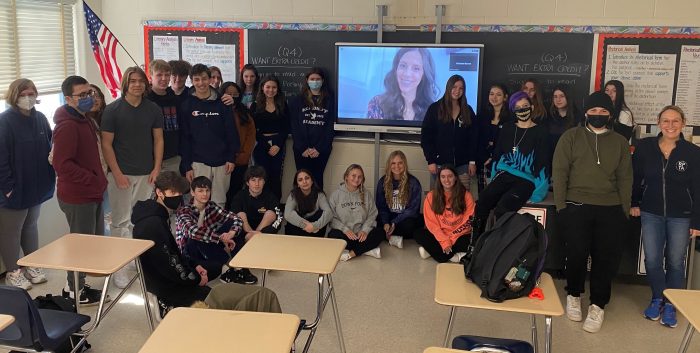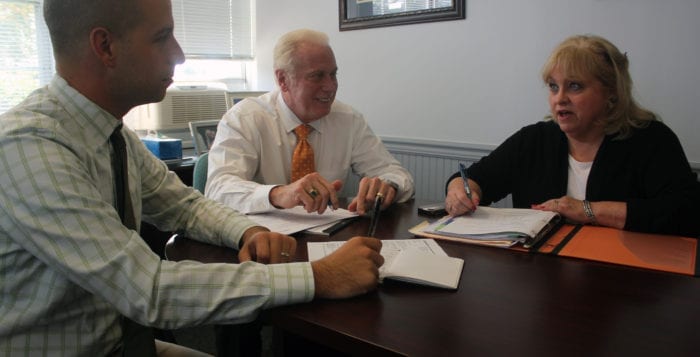By Kevin Redding
With the yearly rise in the number of Mount Sinai students who refuse to take standardized tests — in relation to a statewide movement against Common Core — district administrators have rolled out new ways to assess and strengthen learning skills. So far, three months into the school year, school leaders believe students are reaping the benefits.
“We’re doing things differently than we’ve ever done before,” said Mount Sinai Superintendent Gordon Brosdal during a Nov. 15 board of education meeting.
Brosdal said the district has implemented new literacy-based assessment programs to fill a great need to measure the academic abilities of elementary and middle school students. Since the 2012-13 school year, more and more students have opted out of the state’s English Language Arts and Math standardized exams, which are administered to evaluate those in grades three through eight, Brosdal said.
“I don’t necessarily agree with Common Core … but it’s important for kids to take the test because you get information out of them. What do we do to inform us about the kids who don’t take it? Or get more information on those that do?”
— Gordon Brosdal
“We went from a participation rate of 97 percent down to 40 percent,” he said, pointing to the uproar among members of the community over the adoption of Common Core as the main cause. Those against the tests criticize the pressures it places on students and teachers. “I don’t necessarily agree with Common Core … but it’s important for kids to take the test because you get information out of them. What do we do to inform us about the kids who don’t take it? Or get more information on those that do?”
Joined by district principals — Peter Pramataris of the middle school and Rob Catlin of the elementary school — Brosdal showcased the growth of students at both schools as a result of the newly implemented programs. Fountas & Pinnell, which started in September, gauges the reading and comprehension level of individual
students by having them read a book with their teacher three times a year. It’s a more relaxed form of testing that serves to measure a student’s progression throughout the year while also encouraging them to find the fun in reading.
When the student demonstrates overall reading ability and understanding of the text, he or she graduates to more challenging books. Books are organized into letter-based levels, “A” books being Dr. Suess and “Z” books being “Harry Potter and the Goblet of Fire.”
In a demonstration of the district’s Columbia Writing Program, which was put in place three years ago as a
result of weakness in the subject across the elementary and middle schools, Pramataris compared a middle school student’s writing assignment from the second day of school to a writing assignment in October. As he pointed out, the second assignment was lengthier, and the student’s narrative skills were punchier.
Academic Intervention Services — help offered by the state at schools to help students achieve the learning standards, monitors and helps those falling behind.
“We see weaknesses and we want to make them stronger and really work at it,” Brosdal said. “I believe our students have become better writers and readers and they will only get stronger. We’re going to see a lot of good things.”
Catlin, who was hired as principal of the elementary school over the summer, came to the district already well versed in the new programs and was determined to help initiate them.
“We’ve really developed a district wide action plan this year,” Catlin said. “The absence of meaningful assessment results required us to have meaningful in-house assessments. We can’t be in the dark about how a majority of our kids, who don’t take the state tests, are doing.”
“The absence of meaningful assessment results required us to have meaningful in-house assessments. We can’t be in the dark about how a majority of our kids, who don’t take the state tests, are doing.”
— Rob Catlin
Catlin said in the first Fountas & Pinnell session performed by the district, teachers observed that 45 percent of students in lower elementary grades (first and second) performed at or above grade level. In the upper elementary grades (third and fourth) 22 percent of students performed at or above grade level.
“There are many reasons for this,” Catlin said. “As they say, data doesn’t answer questions, it just opens up questions and makes you think more about why things are happening.”
He explained that while students at these grade levels may have understood the books they were reading, they aren’t used to answering the high level of questions about it, and aren’t engaging in enough independent reading to practice these skills.
Now that teachers have that information about the student, they will be able to directly address their needs before the second session, which takes place in January. In the meantime, the elementary school librarian has started leveling books in the library and Scholastic money from the PTO, totaling $4,000, is being used to purchase more leveled books, Catlin said.
“Now we can use resources to really target their needs,” Catlin said. “And we’re able to see progress quickly, which is nice, and not have to wait until April when the state tests are taken.”
Deena Timo, executive director of educational services and another integral player in bringing the programs to the school, said of the state tests: “We’ve always viewed them as just a little snapshot in time and not the be all, end all to assess a child. It’s that, taken with a lot of things done in the classroom throughout the year that give you a good picture of a student.”
While Brosdal said he wishes more students took the Common Core tests in order to prepare for Regents exams once they reach the high school, he agreed.
“When you have to push the state stuff aside you ask, ‘Now what do we have to measure our kids?’” Brosdal said. “In the classroom, are we seeing growth? Are they engaged now where they weren’t earlier in the year? We are reacting to what we’re seeing, trying to put better things in place. I believe we’re heading in the right direction.”








